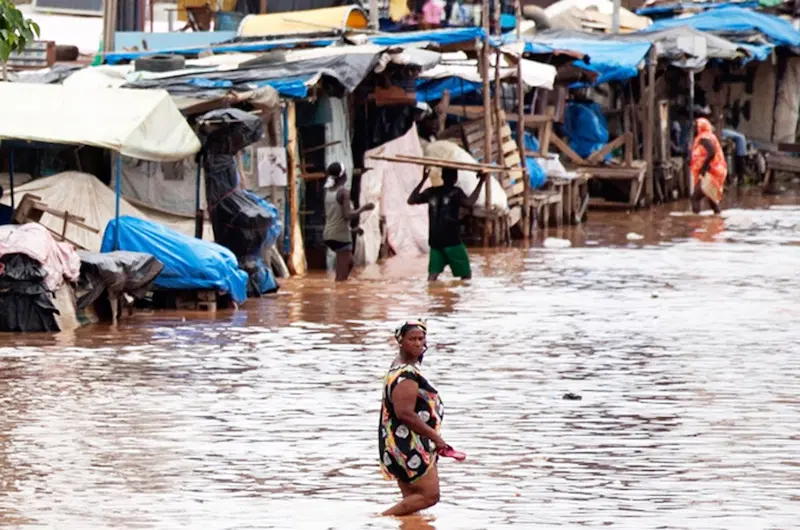On Friday, August 22, 2025, health and climate experts warned of a growing public health emergency in Nigeria driven by climate change, with floods, rising temperatures, and erratic weather patterns intensifying diseases like malaria, cholera, respiratory infections, and malnutrition, particularly impacting vulnerable women and children, as reported by Vanguard and ThisDay. Recent floods in Mokwa, Niger State, killed over 200 people, displaced thousands, and contaminated water sources, exacerbating cholera and typhoid outbreaks, per Guardian Nigeria (). The Nigeria Centre for Disease Control and Prevention (NCDC) issued a cholera alert, noting 3,109 suspected cases and 86 deaths by June 2025, with Zamfara accounting for 32% of cases (Guardian Nigeria). The Federal Ministry of Health’s 2024 Vulnerability and Adaptation Assessment projects a 21% rise in disease burden and a doubling of heat-related deaths by 2080 (Public Health Nigeria).
Malaria and Cholera Surge
Research Fellow Adeniyi Adeneye from the Nigeria Institute of Medical Research (NIMR) highlighted that prolonged rainfall and flooding, worsened by climate change, create mosquito breeding sites, increasing malaria transmission in Lagos, where 80% of cases occur indoors (Vanguard). A 2025 study he co-authored found zero use of Long-Lasting Insecticidal Nets (LLINs) in surveyed households due to heat discomfort, with rising temperatures also risking Artemisinin-based Combination Therapy resistance (African Journal of Environmental Sciences). The NCDC reported a 50% rise in cholera cases in coastal regions over the past decade, linked to floods contaminating water sources (Nigeria Health Watch). Nigeria’s 2025 Flood Outlook identifies 1,200 high-risk flood communities across 30 states, fueling waterborne diseases (TheCable).
Respiratory Issues and Malnutrition
Environmental pollution, including black soot from illegal refineries in Port Harcourt and generator fumes in Lagos, has led to a 20% increase in respiratory illnesses, with PM2.5 levels exceeding WHO thresholds by 300% (African Journal of Environmental Sciences). In the Niger Delta, children face chronic respiratory risks, with a 15% rise in infant asthma cases (Vanguard). Climate-driven crop failures and floods have worsened food insecurity, with 11 million children under five stunted and a 5% increased risk of preterm births per 1°C temperature rise (WHO). The Society for Gastroenterology and Hepatology in Nigeria (SOGHIN) noted a surge in viral hepatitis and liver cancer linked to climate impacts (Vanguard).
Mental Health and Infrastructure Strain
Climate-induced displacement and crop losses are driving anxiety and depression, particularly in rural areas, with mental health nurse Hauwa Ibrahim reporting rising cases in Lagos (Vanguard). The elderly and disabled are disproportionately affected, often unable to evacuate during floods (UN News). Nigeria’s health system, with only 0.4 doctors per 1,000 people (WHO, 2024), is overwhelmed, with families like James Duru spending ₦50,000 on typhoid treatment, half a monthly income (Vanguard). Over 60% of waste is improperly disposed, contributing to air and water pollution (Federal Ministry of Environment).
Expert Calls for Action
Dr. Ozuomba Sixtus, Chairman of the Society of Family Physicians of Nigeria (SOFPON) Lagos Chapter, described climate change as a “lived reality,” linking erratic rainfall and droughts to rising asthma, cholera, and preterm deliveries (Vanguard). Professor Akin Osibogun, former LUTH Chief Medical Director, urged people-centered policies, emphasizing clean energy and emission controls over revenue-driven enforcement (Vanguard). The Federal Ministry of Health’s draft Health National Adaptation Plan (HNAP) aims to integrate early-warning systems and resilient infrastructure (Public Health Nigeria). X posts from @Naija_Activist (August 21, 2025) demanded urgent government action, while @HealthNG highlighted 2024 as the hottest year on record, per WMO, exacerbating Nigeria’s crisis with 50°C heat indices (Vanguard). Without proactive measures, experts warn Nigeria faces a deadlier future, with WHO projecting 250,000 annual global climate-related deaths by 2030 (WHO).

Leave a Reply